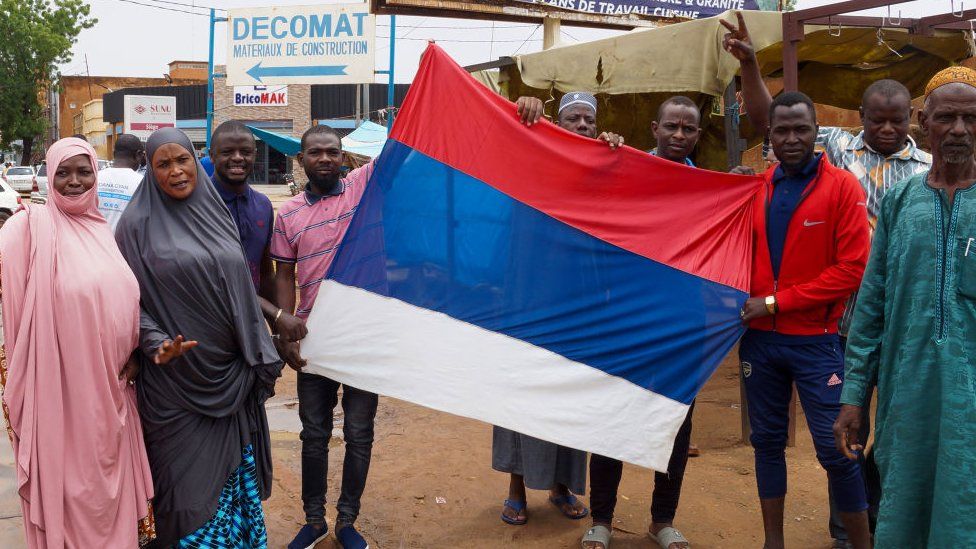Niger's democratically elected President Mohamed Bazoum has been overthrown by the very people who were supposed to protect and uphold his office – the presidential guards who stood watch outside his palace.
President Bazoum was the first elected leader to succeed another in Niger since independence in 1960. Now his captors have suspended the country's constitution and installed Gen Abdourahmane Tchiani as head of state.
Niger is a key part of the African region known as the Sahel – a belt of land that stretches from the Atlantic Ocean to the Red Sea. The area is plagued by jihadists and beset by military regimes.
Western nations had looked to Niger as a bulwark against further disorder and spreading Russian influence in the region. But that turned out to be short-lived.
Here's what you need to know about the crisis.
Why is Niger important?
Geographically, it is the largest country in West Africa.
Politically, it had been seen as an example of relative democratic stability in recent years, while its neighbours Mali and Burkina Faso had already succumbed to military coups.
Strategically, it hosts French and US military bases and is seen as a key partner in the fight against Islamist insurgents.
In fact, the US state department describes Niger as "important as a linchpin for stability in the Sahel" and "a reliable counter-terrorism partner" against various Islamist groups linked to either Islamic State or al-Qaeda.
Economically, it is rich in uranium – producing 7% of all global supplies. The radioactive metal looms so large in the country's economy that one of the grandest thoroughfares in the capital, Niamey, is named the Avenue de l'Uranium.
However, Niger's people consistently rank as having the lowest standards of living anywhere in the world.

Why did the coup happen?
The Sahel region is a turbulent and unstable part of the world and democracy is currently in retreat there.
Violent Islamist groups have gained ground by controlling territory and conducting attacks in the tri-border region between Mali, Niger and Burkina Faso.
The mutinous soldiers in Niger have cited this worsening security situation as a reason for their uprising, although Niger was handling the insurgencies far better than Mali and Burkina Faso before their own coups.
The growing unrest has led some to believe that only harsh military crackdowns can solve the problem, hence the popular support that the coup seems to enjoy in some quarters.
However, it is far from clear that a military junta would have greater success in tackling the insurgents than the recently ousted government. The takeovers in neighbouring countries have not made much difference.
- Did coups in Mali and Burkina Faso halt jihadist attacks?
Adding to the instability in the region, climate change is causing desertification to spread southwards from the Sahara into the Sahel. Experts say temperatures in the Sahel are rising faster than anywhere else in the world.
What's the international reaction to the coup?
France, the former colonial power, has been stern in its condemnation of the military takeover.
A statement by the French foreign ministry said President Bazoum was the country's sole leader, adding that France "does not recognise the authorities resulting from the putsch led by Gen Tchiani".
It added that France "reaffirmed in the strongest terms the clear demands of the international community calling for the immediate restoration of constitutional order and democratically-elected civilian government in Niger".
The US Secretary of State, Anthony Blinken, has called for the president's immediate release, while the African Union, the West African regional bloc Ecowas, the EU and the UN have all spoken out against the coup.
The only voice in favour has been that of the leader of Russia's Wagner mercenary group, Yevgeny Prigozhin, who has reportedly described it as a triumph.
"What happened in Niger is nothing other than the struggle of the people of Niger with their colonisers," he was quoted as saying on a Wagner-affiliated Telegram channel, although his comments have not been independently verified.
What's it got to do with Russia and Wagner?
As well as jihadist groups, the Wagner mercenaries, who are active elsewhere in the region, have been seen as exercising a malign influence in Niger. Some supporters of the coup have been seen waving the Russian flag alongside that of Niger.
 Image source, Getty ImagesImage caption, Supporters of the coup have been waving the Russian flag
Image source, Getty ImagesImage caption, Supporters of the coup have been waving the Russian flag
Before the coup, President Bazoum had complained of "disinformation campaigns" by Wagner against his government – and there is little doubt that Wagner, which has exploited mineral resources in other African countries to fund its operations, would like to do the same in Niger.
The US has said there is no indication that the Wagner force was involved in the overthrow of President Bazoum, but added that the situation continues to be quite fluid.
- Niger coup makes a troubled region yet more fragile
Now there are concerns that Niger's new leadership could move away from its Western allies and closer to Russia.
If it does, it would follow in the footsteps of Burkina Faso and Mali, which have both pivoted towards Moscow since their own military coups.
What other global consequences could the coup have?
President Bazoum's government has been a partner to European countries trying to stop the flow of migrants across the Mediterranean Sea, agreeing to take back hundreds of migrants from detention centres in Libya.
He has also cracked down on human traffickers in what had been a key transit point between other countries in West Africa and those further north.
That may now be called into question.
